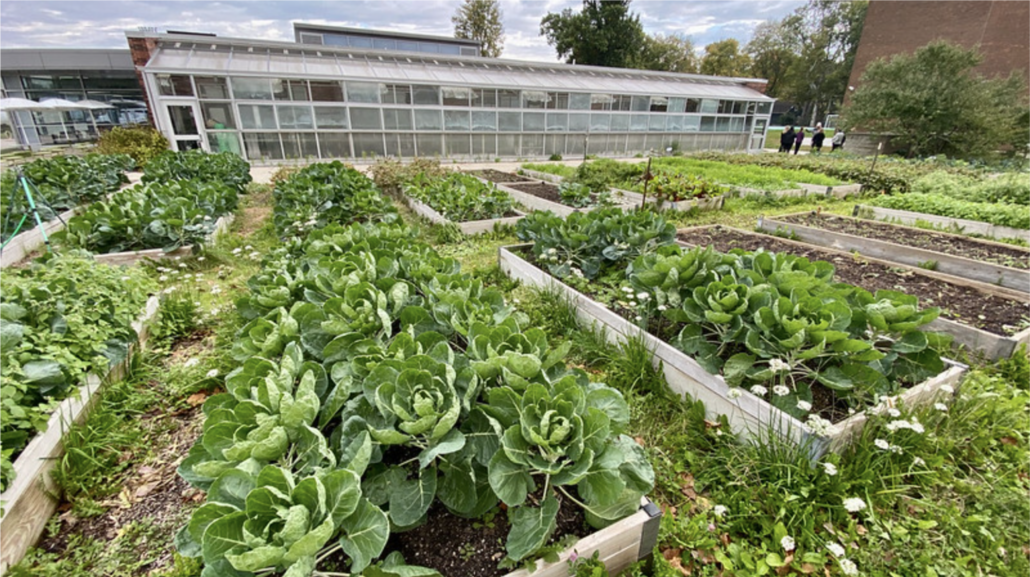By Lauren Formosa
Despite being surrounded by expansive agricultural areas, Grand Rapids offers limited opportunities for residents to get involved with food production through urban agriculture. Access to fresh and affordable food has become especially concerning in the city’s low-income communities and communities of color, which have historically suffered from an inability to achieve food sovereignty.
The Grow Collective, previously known as the Freedom Farm Collective, seeks to minimize food insecurity in southeast Grand Rapids and get marginalized people engaged in urban agriculture programs to participate in their local food systems directly.
Through a collaborative effort between the West Michigan Environmental Action Council (WMEAC), South East Market, and Reyes & Kelly Innovations, among others, with funding from the U.S. Department of Agriculture (USDA) Urban Agriculture and Innovative Production (UAIP) Planning Grant, Grow Collective recognized the Third Ward (49507 and -06) as the community of focus for providing resources and assistance in building agricultural programs.
Grow Collective’s programming will focus on providing opportunities to learn more about sustainable agricultural practices, regardless of factors such as age or skill level. Through its researched and developed Intergenerational Urban Agriculture curriculum, the collective engages both youth and elders in the community to provide a unique learning experience relating food sovereignty to topics including mental health, cultural practices from the Latino, African American, and Native American communities, and environmentalism.
In addition, Grow Collective is working to develop community gardens in spaces such as Martin Luther King Park as well as support aspiring farmers of color through the Farmer Incubator Program by giving them the opportunity to learn from and train under experts in the field.
All of these programs hope to provide a visible representation of what is possible through community engagement in urban agriculture, helping communities in the Third Ward develop economically and infrastructurally within an area that has been overlooked and underserved.
Residents of the King Park Neighborhood on the city’s southeast side have been identified as having disparities in socioeconomic and health-related opportunities. According to the USDA Food Access Research Atlas, they have limited access to fresh and healthy food options, with the closest full-service grocery store being more than half a mile away from most residents.
The neighborhood comprises 60% Black and 14% Hispanic residents with more than 40% of the area’s population falling below the poverty line. The Third Ward as a whole makes up one-fifth of the city’s population, consisting of 70% People of Color and experiencing similar poverty rates as the King Park Neighborhood.
Food accessibility in southeast Grand Rapids is primarily reliant on convenience stores, small grocers, and occasional farmers markets. Affordable and good-quality fresh food is not regularly available to residents in these neighborhoods, creating a food desert and leading to long-term health, social, and economic issues.
Other grassroots efforts within the Third Ward have sought to promote food sovereignty in similar ways. However, many of these programs have only been able to serve a fraction of the neighbors experiencing food insecurity.
Urban agriculture programs have been essential to engaging underserved communities in food sovereignty, allowing people to not only have access to sustainable and affordable food sources but also reintroduce farming as a more inclusive field for everyone. Exposing young and ambitious farmers of color to agricultural opportunities within their metropolitan communities can help break down barriers to entry that have historically kept people of color out of the country’s food systems.
Through urban agriculture, Grow Collective’s ultimate goal is to further foster self-determination and environmental justice by bringing everyone to create a more equitable food system throughout Grand Rapids.
Grow Collective prioritizes engaging marginalized communities in southeast Grand Rapids through agricultural programming targeted to and created for them, helping people see themselves represented as leaders in the city’s food system and increasing food security.
The collective’s mission to empower food sovereignty and environmental justice as well as increase diversity amongst the farming community relies on six pillars: food, culture, art, economy, spirituality, and nature. Grow Collective uses these pillars as the base of its programming to foster a strong sense of community within its urban agriculture efforts.
Aligning with Blandford Nature Center to help carry out its nonprofit work, Grow Collective is hopeful to continue developing opportunities for emerging farmers to learn agricultural practices within their local communities and grow their entrepreneurial expertise, striving towards a future where food sovereignty for all within Grand Rapids is not only achievable with community support but sustainable for years to come.

